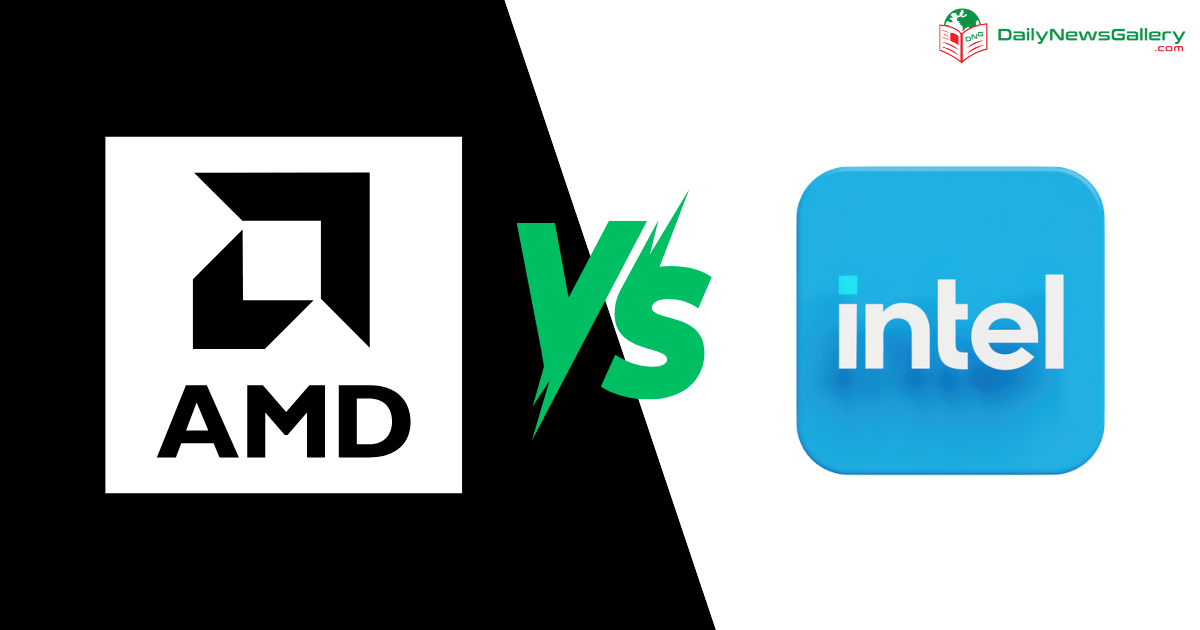
In the ever-evolving world of computing, the rivalry between AMD and Intel stands as one of the most enduring and fiercely debated topics.
As we step into 2023, the competition has intensified with both giants releasing groundbreaking processors that promise to redefine computing performance. Here, we delve deep into the intricacies of both, helping you make an informed decision for your next upgrade.
Historical Background
Both AMD and Intel have been at the forefront of the computing world for decades, constantly vying to offer the fastest, most capable, and feature-rich processors.
While Intel maintained a stronghold on flagship performance between 2005 and 2015, AMD made a significant comeback with the launch of its Ryzen processors in 2017.
This marked the beginning of a neck-and-neck race, with both companies now offering unprecedented CPU performance in mainstream components.
Desktop Processors: A Price Comparison
The latest offerings from both companies are nothing short of a technological marvel. AMD has recently launched its Ryzen 7000 series, while Intel has unveiled the 13th-generation Raptor Lake processors. These CPUs boast up to 24 cores, clock speeds nearing 6GHz, and a cache size that was once unthinkable.
Both AMD and Intel have a wide range of processors catering to various needs and budgets. While the last-generation Ryzen 5000 and 12th-gen Alder Lake offer considerable value, the newest releases promise cutting-edge features and performance, albeit at a higher price point.
Performance Analysis
Gaming Performance

When it comes to gaming, both AMD and Intel offer processors that deliver stellar performance. Intel CPUs, known for their higher instructions-per-clock (IPC) and single-thread clock speed, have traditionally been the go-to choice for gamers.
However, AMD has significantly upped its game, offering flexible overclocking options and processors like the Ryzen 5800X3D that compete neck and neck with Intel’s offerings.
Multitasking and Content Creation
For users who prioritize video editing, content creation, and other high-intensity tasks, the number of cores a processor has becomes a critical factor.
Here, AMD seems to have a slight edge, offering processors with higher core counts that excel in multitasking environments and provide efficient energy consumption.
Laptop Processors
In the laptop segment, Intel continues to dominate, with most notebooks featuring various generations of Intel processors.
However, AMD is steadily gaining ground, with its Ryzen 6000 and the upcoming 7000 mobile CPUs showcasing impressive performance and efficiency.
Depending on the specific tasks and the type of laptop you are aiming for, both AMD and Intel offer credible options that promise both performance and value.
High-End Desktop Processors
For users seeking extreme performance for tasks like high-resolution video editing or CAD work, high-end desktop (HEDT) CPUs become a consideration.
In this segment, AMD’s Threadripper series stands out, offering up to 64 cores and supporting double the number of simultaneous threads, all while maintaining impressive clock speeds.
These processors, although expensive, provide unparalleled performance, especially for professionals who can leverage the extra cores for accelerated work processes.
FAQ
1. How long have AMD and Intel been competing in the CPU market?
Answer: AMD and Intel have been competing for decades, with each company vying to offer the fastest and most feature-rich processors. The rivalry has seen various shifts in dominance over the years.
2. Which company currently offers the fastest processors?
Answer: Both AMD and Intel offer processors with exceptional performance. As of 2023, the competition is neck-and-neck, with both companies releasing groundbreaking processors that compete closely in various benchmarks.
3. How do AMD’s Ryzen processors compare to Intel’s offerings?
Answer: AMD’s Ryzen processors, especially since their debut in 2017, have brought significant competition to Intel. They excel in multitasking environments due to their higher core counts and have become increasingly competitive in gaming and single-threaded tasks.
4. Are Intel processors better for gaming?
Answer: Historically, Intel CPUs, known for their higher single-thread clock speed, were the preferred choice for gamers. However, AMD’s recent processors, like the Ryzen 5800X3D, offer competitive gaming performance, making the choice more nuanced based on specific needs and budgets.
5. Which company offers better value in the mid-range segment?
Answer: As of the latest releases, Intel’s mid-range options, such as the Core i5-13600K, provide more value for money, especially for gamers. However, AMD’s offerings are also competitive, and the best choice often depends on specific use-cases and preferences.
6. How do AMD and Intel laptop processors compare?
Answer: Intel has traditionally dominated the laptop segment. However, AMD’s Ryzen 6000 and upcoming 7000 mobile CPUs are showing impressive performance and efficiency, making them strong contenders in the laptop market.
7. What are high-end desktop (HEDT) CPUs, and which company excels in this segment?
Answer: HEDT CPUs are designed for extreme performance tasks like high-resolution video editing or CAD work. In this segment, AMD’s Threadripper series, offering up to 64 cores, stands out for its unparalleled performance.
8. Do both AMD and Intel processors support overclocking?
Answer: Yes, both AMD and Intel offer processors that support overclocking. However, the flexibility and performance gains from overclocking can vary based on the specific model and architecture.
9. Are AMD processors more energy-efficient than Intel?
Answer: AMD processors, especially in their recent Ryzen series, are known for efficient energy consumption, often offering better performance-per-watt ratios. However, energy efficiency can vary based on the specific model and use case.
10. With the rapid advancements in technology, how often should I consider upgrading my CPU?
Answer: The need to upgrade depends on your specific tasks and performance requirements. For general tasks, a good CPU can last several years. However, for high-end gaming or professional work, you might consider upgrading more frequently to leverage the latest technological advancements.
Choosing between AMD and Intel is no easy task, as both companies offer processors that excel in different areas. For everyday tasks and gaming, both AMD and Intel processors offer excellent performance right out of the box. However, when it comes to intensive multitasking and content creation, the choice becomes more nuanced.
Intel’s mid-range options provide more value for money, especially for users focused on gaming. On the other hand, AMD’s offerings shine in multitasking environments, often offering better battery life in laptops and a competitive edge in high-end desktop computing.
The choice between AMD and Intel boils down to your specific needs and the tasks you intend to perform on your system. Both companies are at the pinnacle of innovation, pushing each other to develop better, more powerful processors that cater to a wide range of users.






